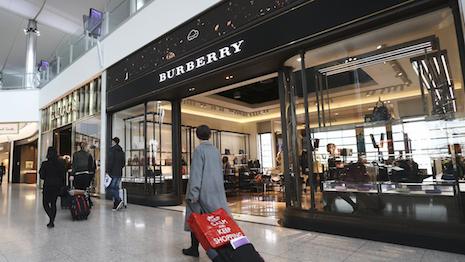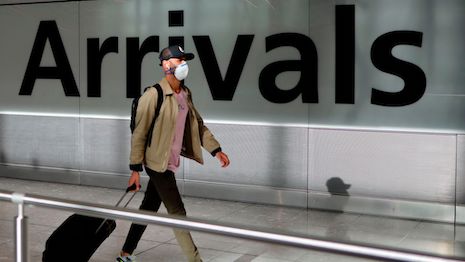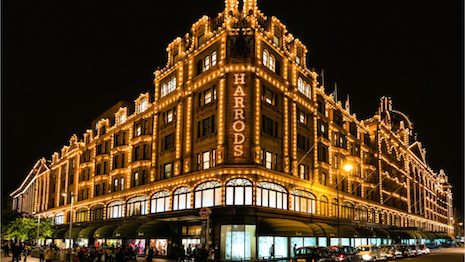British luxury brands have issued a call to arms to the U.K. government to take urgent measures to rescue Burberry, Turnbull & Asser and other iconic labels from the devastating economic burden of COVID-19, per a new report from Walpole.
This includes a call to abolish plans to scrap tax-free shopping zones — a controversial decision leaving brands concerned that international buyers will flock to Paris or Milan instead.From the first of January, the United Kingdom will be the only place in Europe not to offer tax-refundable shopping to travelers.
“Overseas visitors are critical to the luxury sector, so with an entire quarter’s trading hit by the lockdown, the luxury sector in the U.K. has been very deeply affected — as it has across the world,” said Helen Brocklebank, chief executive of Walpole. “After more than 12 years of sustained growth, 2020, it’s fair to say, will be very painful and 2021 will still be below expectations.”
Dependence on inbound travel
Walpole members say that a third of their U.K. sales come from tourists, with American, Chinese, Middle Eastern and European buyers counting as important clients, according to the trade group’s position paper, British Luxury COVID-19 Recovery.
Walpole is the trade association and lobbying group which represents more than 270 high-end retailers from Alexander McQueen and Temperley London to Rolls-Royce, Harrod’s and Glenfiddich.
 An estimated $5.84 billion, or £4.5 billion, in luxury sales was generated last year by international visitors to the United Kingdom. Image credit: Walpole, Heathrow Airport
An estimated $5.84 billion, or £4.5 billion, in luxury sales was generated last year by international visitors to the United Kingdom. Image credit: Walpole, Heathrow Airport
Before the arrival of COVID-19, the British luxury sector was on a roll, contributing 48 billion pounds, or $62.4 million in to the U.K. economy and outpacing the country's wider annual growth rate of 9.6 percent. The sector provided over 160,000 jobs throughout the U.K. and accounted for 8 percent of all U.K. exports, per Walpole’s research.
In the months since its outbreak, the impact of COVID-19 has taken a dismal toll. From March through June, store revenues at many luxury houses dropped to zero, according to Walpole.
As a result, the impact of operating costs has been crippling. In a recent survey, British luxury brands said that rents and leases on their stores made up about 30 percent of their fixed costs alone.
Predictions for the coming months are even more dire. With stores closed for the past three months and foot traffic to stores expected to fall by 70 percent in the near term, many luxury houses’ rent will equate to around 100 percent of their turnover before the cost of employees and other bills are even considered.
On the list of Walpole’s paper offered policy suggestions to its country’s politicians are a few proposals to stave off more challenges for the sector.
Walpole suggests quarantines should be replaced by a COVID-19 testing program at Heathrow airport.
 London's Heathrow airport was amongst the busiest worldwide until the COVID-19 lockdown. Image credit: Walpole
London's Heathrow airport was amongst the busiest worldwide until the COVID-19 lockdown. Image credit: Walpole
The group also argues the decision to scrap tax-free shopping for international visitors should be reversed and refund systems should be digitized. Tax-free shopping should also be offered to Europeans too plus a visa-waiver system should be introduced for “high-value” visitors (see story).
On the local policy front, to protect employment, Walpole is calling on Prime Minister Boris Johnson and his party to extend the country’s furlough and partial employment scheme beyond October. Grants and loans to support businesses’ liquidity and packages to aid businesses unable to pay rents are also necessary.
On top of this, measures should be taken to boost London shopping by removing Sunday trading restrictions in the West End and Knightsbridge as well as allowing increased parking and temporary changes to the congestion charge. The VAT tax should also be reviewed, per Walpole.
Braced for the future
It is hard to square the current meltdown with the fact that the British luxury business was just growing at more than double the rate of the United Kingdom’s overall economy, a promising sign that came despite all of the uncertainty around Brexit.
According to a report last year from Walpole, Britain’s luxury business achieved almost 50 percent growth in the four years from 2013 to 2017 thanks to exports, tourism and manufacturing (see story).
It is widely thought that creativity and innovations will help the British luxury industry regain its footing as it looks to recover from the global pandemic.
The most important take-away perhaps is that the pandemic has made ecommerce and sustainability even more important in luxury, especially as brands work to connect with younger consumers (see story).
Brands that made charitable and humanitarian efforts during the pandemic, such as Claridge's move to house medical staff in its hotel, are likely to see a boost when the situation improves.
“It would be a reasonable assumption to say that those that responded best will see the biggest gains over the months as customers continue to connect,” said Walpole’s Ms. Brocklebank.
{"ct":"uj84X05\/E0fh1IGIo1zgVHuU8fYjFF3nUQdDCF1mjkCYj2GbPlktzdC\/eFImtjdCaWGP4o5P3kPVCGJCBC7ArMlWnSbS5Im7EY7B3QtMPS7TVj6zh+hsxC7B3YmLurcnWwV3OUDPLtTwooMDDIPmNwN1xLw4Id09RuTCYiABaJm0rO7VMJnM\/bscRK9g4D7LTCa8CIZxy3swue321798CUZd8+p6TYFuGkSa7m0IHDzGldP02fkTleDzXWTjzNq8NJbO5Aoo\/VojYrLRIUd34qndJlw5HNZbhqOKwM29Imz6gt7M+EQAZ43CPoCfRw+lcuhFOsh2j04krh5CVT8QY0v6D7n9cBR01PQV2KTVunTZwHc2zsirzyR5n0rSF\/D8ekB8jLGfI6YASdn67\/tYeV0Ppd1YAQ6Vm\/XYg72jevi0XTvSvcworsJ1n7AjmMNc0Oz4WbgyjUt5DSzrwDjGdIcOq\/YtlBD5qhmfZKlLGlYsnr04U6qQ8Sp+DEQRyQlPVIUtyNsLSi7HRiNpg601D3itIZyJulydMMPcfwHmNhRouTCJ0vb1bQ5eOJ0WWAeuSkEQQohmhSbVuAefCAY7OVa23Q9hoRaSVtJ1JW2vskmuVh1HTqOrEJJb0sM9A1BmtWpClK1snCZ9gAonC2ZVTRu22zekeT3CEElSVZoK5H81zR9bfeBs4EBY+aEhoVkM8iHjguNsKa0tCAY8prCa4hHhwk+TJ+3Xpm4ClcrUtbdHWajMFbnvn9mEOvr2OPjynrntkFOEU\/Y2GqRJ1EZ1\/IilLyM0Q3\/j5kBuBkdrOlKSUuL9UjNa2pEY4UewPbSuCngRodv1ivKCJIBwc\/XdBiuV3yt2QB2UTDPzQDtqbkd16T+FM1gYnzVkHpa71nETohiYR5knM4YvD8YqwCTR7XxYDuHNErF+svvI5uWQIfY\/fiy404y847JWr1UdHL7Vx0\/1Fymormtdxd+KqAYoPDo5EU1K588bg1tUEOLFbUw1y2K3xMOno9b8EBGHvLQGc4R+ACXmUBYYsmUIzxAAfd4uLMz1lXnINWrDpBc5JfjfjAjxoRmTRo1ch8aL\/tus3H07h8APWQXv1BETIii\/q9BCOXBZFtQi9XwgmDzReDY1Q5aNvREgqbdYV0zFlqBnPAaekLVjRW8x1QPHkwqeNGR2PXf2+5NyZu2OcRKBTkt\/OMQgqfqqxQskyMWsAcEo712lH4ok0P4Sq97y1VlGyRrlu0DnnXdU\/PUoLUcKaZgQ+7bnjqVMKA3ke6HhQhQNqio22KK1\/ViLXwOf0Oo\/7oyULCm3BgMKswZI\/\/iebl5bwifANkeRL9L1L0ZIDsRr5v\/5tX7L6hSArVz97DC1YR4kW68wg5UwTxHDX8OtjWLMB4whFT31He63B3Gmnzi2e6sZ5+O1Z0duwR4KV0AEyN+Zb+9SnqUPhB2MPaGAs8ex\/mnQOOR73MvfIfhu9MLr0YmJ4gu+s+DDAxjCW9t5R10hE1uqpne1Yr1JcbdcqlbCWrYSD1duzn\/GoIhLhUh5hJQDGtkkbU0UhaMhoSGo6Wl6A9+u1pXV8CYIEB+TIWWB\/dSNjAhDbFR3VrT\/K94ueMpsdAJ03jUGSF2qvJZ5asFg2xvRhe2OIaf4D1XXmrHtxC9drjl0wiCx+cMqGzz0pZkqViZcZrHPBnUZsygosRHb+QHQ91d+6CoX3LQ54vI788klZJZa8BJrwszX6iJfHWVSGI04ebBSOjOf9W5YXqQKPKEtZY0fmERprTmafrSLJzfU4WbWolwl2mopN3LZm6KwSl7H\/9j9bC1XFpWRVQUb8tH4lz93h6Qh874exUN4OAvElVLp+XWAncnFqDObNU3SdNgH+zaM42Hb4RfbE0I45ZlSpshiTzIyTZ4jrZK7YcxHO40qBSfen9RM57bZjUMQOkLXy+sC\/PHB3urEmx\/w+geAhOgmlZGF+mjeirRgIniT+DuEhRiB7P7784\/0NIp7f\/H8zr25Iz9Dg7KeXLb444kCPyMOBPJs8AU6ZUoShnGwr\/Xf7IzOBfT\/cMKKz5EkXhLwDO89K\/oTKr77DGN7lYr4779WyVeuaUFpvnqyOX+9mDbBYsxQVHdob1WRFvLK8LuuWARcLrZcR2gp9cNIiGsR86BFuzXbn8wNxzLwA0ocp2LMj86AI6nqBHOc7XJJYQyyiy4Gsdcyn2BzLp2qLjN7OAJmL4G7xD2m2Zc5uEGghLxYFaugdET1LvlYhmbxzN7NNuWREnz3\/w6pifRG6vnClsLWWTtXcXjqevvj5aaHRlkEKpkKtl4fh\/NB82B8zATv71eBx+BAfS0uc89cBaZKB2VDryKkC90Z6G\/D18RFZZ0WQE1psD9DDcviHqXag2HqP+orJNNDaKMnxo1nPosSGaX3A1IXd+YoQevjpr3LN4KNDgTvU3+mkT2mL65nXAYNJV5cOJQNhdkWbiPj1YuvglIyYFpQLiVHNzqUiZhkbWucz2QkauSXxlKM3lxNpW+3x0eEErYIUzTytB7sS6Rcnz454PgTV3XuyATqxr7WW7+LA5iJS2CdF0zblrW92AruSchpK6ZjjI8cRCxzGZwbSaLof1l22d33QympxF44i6N2LS4jmkSQDGJ5JWumq2pro0dz44LCrbyBFQIAQw3Y0drX5E8CRvf9im3AhZ\/xdfvlNMxNV5ow2cKhew71B0MEGOB4jarSt7uHG4nriAfqgVliurNvNTvGsRmMIpeHKdcr1r\/wEYxsj68Bu8H8x+Yl6Ob05nkXhOVBqX8g43NDbmOcfXnIkDsXxDxH9edFAectiFuUTxUrm0Pcq\/zF26TzaWp5U5sCqyYoPzwVg6Bklm3s6dqOr82VCIaqnvypgHd4LgsjJnY7PlvsKdrvVH1bfS3mLaUtQ3\/FhHh0C0UF4HE2uwWd21w57Un5Q49JJyJxzp20DOnA6QnagvVhYFqUCHvWkBJ9EN6sOFNiw\/GRWZ+nd7l2iPdsqo+tiH9AqSSoXuJeIAPyaFLKRmyFE8\/mk\/yNNL9Qi1x7zKt\/Uj4+9ukKBYVlYGgqBk1UO7lpYIZaSBEgx90pzpqiYf3A\/TrABJ+RDpvzIxj8DN\/0T3cJ4KEpRGHM9ZArELAmS60tJGwyf7aGG2LCeTMp5gIDDVeW0xr9LuM9DXEhUqfFZNz++O+qCzC+P47fNJB0IEzJxqjYUAI4DI7PdZcoTpeHw6CX8rpInAax1bPMdKfmg1EMU\/\/jPA2ifMmzSq+ztvhx+g4tMDp48UfF0f+B9YoIkotTOaypwJ339++xmVlOpgf3QOt54d2hzb\/M17ZbVwjSwD3xeDOCfS6x0YDkyA5rXiLly74aTUzP170FX38lezixui92qySXwCbRSQW0bNTSWvAaiH0jwEUsi+fG5+eC4CV3\/fdbdJ63vWIe0RjuM50wqDENPRhnds1\/BC9gG2bZqT\/RMTj2YOSHqtofvZRywTodaNdqkN1hKtHeKVjnbnMNIDsFzO+Iu81QgNbg5SiSi89DJU38xNz0GnaxT5auSFxvtdOhOB9Wabbq+BUv6OvVCbs0E9nSTCRyzQ\/aF2ttrLYYfxr+sC7DpIZFuGgw35bjqLPie+tsiwyMmDuvVWFFQR3Y4ws+dWNnT4Afy9b8QVvfjTjj9Qpnsk5+Ov+3d4teNRTc+90ltHqftNfERZhhvdIPq\/J7RFMQyzJwgSUu0WjPG5NZn6YvhUvydhy60vARNKOivXKVh1gQZtA7nu8MH6mnnrtjlRgYu9qZqNjCi+gZ0N04cMj\/a4f+tyNtqBvnUv+AlHJzNZ5zIQxMd4lmteZVhGcfb8ln20VoC6Gr7dUIqT+lj6y50xnAw5hcHPGS6NfjWGlhqS4SLJy3547urbmwvwehqrPkGVxXdivG74owbrsHQ2hUTVmIpHorXFgpkxyL5fFLGwQv\/H0f6zZ1cmaYSEbSYK9fhXpUiC1lTJwueIYiUnRmsvUCzNop05dgHYHCsAcK9stPxEx6PRafsHdSVqf2L3uLtRdEJTEOMH8BCZKPhP4P88zPms4\/34pNFO0m3LzGTDBw\/7xsLNy4bNqDjqopZBd1kXbJ4ZmnZCYnSk4HcnnyN1dZ2+2dF7btAE\/LMIVyCZmXYzqPLjj3auj1ONwvnzIQRd2BoUjyNfmQPDMviej8IWUQfCIXi6iYYn5Z4J4RL03JBoUh8ma69H47oI0A5p\/JWK4ylwkN0qkJt9dV8LPd1zHvc4MrHvGv50mp0pqyu4IgVzDgtSbx+8dFjSJDs+TrShuA6o4vpRJ9GTejP1UsFuzuQWj514YIiuvV6JrvkhgFX9ZPYckDGu4Rr\/E3A73Ko\/usrje5OJFKfGtRTkDBdoIZ7oR9TWsXnV3fB1Plh\/NvJ6iOoVZ+N8deBiNrXLUoS0bjRCzkTQGMm+bQuwgFqT2yVxZynZPcmnUjvps1sgxX190hCItMkhZ77Nvw9rflocrE5nKsy9jKFHCab95P4rEH5tI4kb8xdFQgf0qvu+1yhdeusl8dQGepNBnJOgob23XpQQhDt8waO+T\/d6u99TwMOpcWIsOtIqIH2gW7cJvv8bj3CAH+qEsMuoEC2Fn5bI7g9sjLaNh1O59Ayvw3T\/B2u8RQDL\/cGcyao6wXcRXGNO5A\/DZQpgyI5ncQZYwXXP2lSONbFrYiiQ0u8w6G+CtC\/MNARNfNEly2mtW\/JiLsFVyM\/d25iUiwkKhxGW0zp9RNw5YdlE3FCCIuYxe\/JNKW9qu+M1ARDIpXgkUfGB3mUD5yxbLdkP89u2ODLUUcOicDyihMRh3rs2BUtdEEwQzKg8Eq3LitupVaV7QiPm7mPY4hPfoniLxc8Vt04wKTlpKzmSgOiRPRnMu00N16eGYhNfUmXEtxR0HeQ4\/TaE1H8oiabP\/MsS8ia2EEz0Rttb4YXme3J42B21ONdSr9oMl5nKxfCNeCqRY\/\/mg4TJG3MTrHzFVm3K2pcZuKP6Y5T+GiTFM0Zyg9oP\/wFSRYYrsQFTphJPbjmmcHowukLJEGTcuEFPx9hXqO8Xh1GM3hJfR7d7kKWMzK\/BqBtHqUlEOSjhXiQExqr\/jTcu\/u+T+TlbF7sF6jQiARgzqbtUZX5Gay0DOUp3QtWLHgO8Keu6kyy+JnRSlsiExxpIOv0U+\/YwrhSnvr+etKyvDTYJq6J1ypbkBbjbpjMyrAuQFwLa\/XD+J8V13U2feVcQs9AG1xQKrtEJTOQPoh7Yu1H7foNRLqNsmGRBX4j5SClmyv3PRy4fC4+Xugjl4oiUE\/lbpsOhHntjoeyhomFWWA2CrZOosxdj40IcxxR6w6SnoSJJIeNszKNbfAEa7QFNiCqAXo\/q8eUzPy8o0Bbf8EIPCvhZqyg\/raxIP21wxhiEh6Ga7CiutpMnrNV7dpMaOi2iQ7yuwmXbPrbW5imm1MWzJKQ0vAFP55C6scqjpY4y7iQ\/idcPlqn4XcOpFCskNu9qif4k1lPp20VC0AdQyyjFIInOocGgkPpxTwF11+5I0dpzfko\/W5xvOZ+xzrnV6i5Q4dlqKRUAjix3EV9KtSgPp+SGV+h4c63Zb7jmDKdZKNtce2byt8T54wMhdCyUHzrQxe2H\/sBhIcFvd04FqqopahvuyR6qKnNjpmIS0KuESNE\/NJ\/CpCyqZAtvCD36rQbMkxUxusC9epM9Po3bvOqswVxjRzt9JGlZoLShTdxG3ihVoaAwX4pjR0xCAmFr+ECQCK\/O2ZZoL2MICX7MPaDcon4Fh2zyPgXBxDHqr6YD2+i89P7FqNqFogcC1YwTjHHuuFXrequJXzamw96r9P+pACJWCRnfD\/sCRHw\/oGdla2nNOdf5WPdwxoU5\/5MfDL08UIwB3DSUhPPj\/UQO6r3Rn95sZdTkDpnXQoOwTbq+ZmsXKBOiGR7PXMhKWsWJ4dci05apWND5faumohjIkHhpm5NHz+nThaFzY41\/2nuG6rRN8uxoN4fuMgwI3LoWKHap0d1GCn6UrU\/cST7\/f1iIRgo3r4ocYHGtj+vnEIgTXA7hxfbpehTyWUv\/GxdwSsYS3uPPjTcpN74jPE+1Oui5kTjQg3QA+uAfsSiB\/y6zpssjz9AlImtZwdgvDvgNljulGGSlmefLUsHc6X+MOTWDMld07DZDtSsCa\/K3nKI68HzzzRjZgvR7f8lI3IsAfhhPgKquRco4KoES3s8wsPBtv37lDWFZnSsXf8JqVI6fX+SYJcnWsTZR3Eq6GihHhDMUZKYZZvScjlOgzPhUgy4Nm3CSdfxUSWsdzCrjuUAsilcd8IR74M+teoeqejSWyyZP57IupfR\/zkbxzIGHbKnmF0J86kfcKwfvkgYZm5LsCF2zPjqREfVqHFL\/3OidJTu3GyLM1dQ5rf\/7wKBycVXZaasreZRje6mbCe8HWlS6HJqwoJ+Htn2mji9DOSCIjaEqBaGIK80u7NaoXo5vAG1FGyRtzA53uFM3qxOSuVeTd4dCTh3X2NmjZtFJlaX+q+lXx6zeI3DXvioIFEQbCRLOy5I2x+h96vAq5wCXpPOpZRAFIrvO0SOFzV7OCS5\/dct4Qub99lcg8Kch7T6Cjkais730zkVZv5IdEPZagMSMLmxCmW3WXoyW331jZj\/RzZ6rkGGTNbuG4cgZnLktffF880ZfT9Ihx28mh9a8HQczUaGy2Xv7+sKTqdDSXXdBEL1DLwqY24GJp6hHXVMqnQZc8VQwvVEy5pV1hQmbrRzv47x3zSjQLCNOdpbJQxdWPnfeMF9pntFMgrmwwq7rSqoI1ZQR7XxxXOz\/2RLzZCulvBbGB2+ZkTkLKb7mdfrrWoSfume0eEUIYJFqTG35x9au+mGMiY4E8SddLtVfs6puSRZzIQinY8C6DXQombn9y+n438cxQOImuPAUfcz916MxwsRNARaqbMVE1CDwQeDo5FUglXS1futydCOpOPuv57EMbvvQ4LVi6fg6V2mdXOiyef2h7BTcypjquo12dq1mJMlN0q+2Fenwp+G615B4syCGNp\/UXEayLBzphnQRj93Aovl8FWfaz\/fq2TUKQDHGPKWVegwsrcN9XjwNhG5E17zGX8AGxb8yg8HLUDI6VTf5FKnQzhiyNe\/Dms2k3giAhXtDJr2U2DiEgDAQwZImo5kHIyFHldMccVqJkrJ0fQF6734ICcAcbFOwxqHms7XkRMIJkr6iMls96L83C13bzu06Bur3TYiJ\/yNluwaB7babOPurNNfYvAaUE7CzdxjDn3tBmUaDjFvQi4M6VrfdZ4A1aq0hOBv0nCXr28nogziRnSZ4LLTRrtpSanfMDoPz7xh2eVEtSntm6Y4SG4jfjdbutxWV6RoQdx0aVYxL6POO1ok1ojJSA4+mCtXFQVlN\/NGwDYYf3L8EPyzVpo5F7PCePj7aZeG5dIar+vB40tghV2tHbeY7KJpThWAaqfcWwP53Zf7aRVDLUgafUH0oUBLuHR+NzWIHckfabEVIjRnjYoMZIzmBq5iWJ88WSyZDLPtaylpx4O2oQ6DRxYk2sdbT5YXDlkUp1K\/9u8em9wHGK2McAH1Nbj\/uC1dvHBFcbMQk7GSO6m93jaeHsHl76Sk\/D3maQbIShONtV5PHv2k0AV4PhnFRMSL2IuEKwXh8wUbiBAVTM4p2tx72MzgNp9u2qNDsDGzfcYVqkXxY\/7W0sCBQ\/v5Sjo3GAhy11O5I79+qbCp9kW\/v66VP4TY\/48rx4OCincIyJLZo3J6\/dSU+OVrPPEi3N6KJ9Z87wyumoXozSWGxHi2sZ\/2M1YD55AviOpt56Ic8Ekpue27JpnMWYyPd5LyD2BjVrffTaJJWz\/dpTS3P4PevANtzkrM3\/rId47ZkXS9K8GbgJJFjrETwHWGW2CZ4hiyLUfw6xE\/uG4i4viG2xZiGlDNmSSiS5RxcbLUVFSjo7\/k8Q4azngaJsJlgC7FxomjLueYAazBX2ejyC7SWMZwOik7kidV5DmQbzdUEDLTXc3ZpgrpotNbkk8V86WpSsPCI52bjYdA04VOhjE7wfhonTkfh1Ve5unjCKE5x0KcLtVP93A7EV2JmJX5CTWsM70Vzni8Uq+0TOSVwm4d4Lli6wdXLeev\/TjJq16i1KCuMLFtzeDFVeO3\/e4R3rb4FkdqrzjBhdVi\/iKeqnvcHnYY5IrsXFX2Vg4gRXv6twpYG0hl1YFV\/SB\/LZPv58AxyDLBWqNRM1h352Xj0YOYNo0qKSne27x3B68qR9ean5cTe13NQmHhWNkG7doxpq3TC5eisM05ifMwPYMxOv67Ld\/3pE7aS4VlobjQitIv3qViwa3SCavif\/z6+V7YL2I+TmMUPQI\/MPAuxIr5DduvkhG2cDkhyoRVAZFvbngkMBDeDAUOVYr74HqndlDCKPj3hcfislHZvfFwCnPDkwM2CcUgFJ0AXUEeVhjNLI4S+VsTFl3WY3QN\/z4kJ0x+ki3GiS6uNr\/5N0kECXQ00guNR6RRr0AyFHpwM7l+023gpVY\/L4tOqETyDc+ZIoIVbBSbaTSJ3yHC7SkmNHU6XJSCX+KmPJ2NzK1H\/TIm1wwZ9mkoLd2wxE+0yEY7bIBMkVn8xGMMulI6s\/3mZUDCSJdt5nKMJr6QxQFK1oALsS8jGStaQ1EvDz38DOg8y+uAAER8ge9jpVw3gGlRuwFjfOaRGhpICZTqGitdQiU72\/WfOctB5szqn95IeI\/+VeyAr4KI3BmII+LUdmGGupGpRh9JptQDcDziJowkAAhTgmRKArOqkglprTQ+e63A8qqLhqriYqULDy\/MbrmeEJOWXFeTlyFeb2KvjJpttkGIYwY2mAywd+wh82ESOHwfAvlwmwFFewlODKIQUNikK9uVa2o48kIBHSun2QqkE7I58Ec0chQD2QCbtq9mo\/F7ZCgWepTQen0xN0mdw0irP1eLpcwDyaziHwKMweNYlQBwEZ+0J9ot+2FKV6pENQuw3V3MgKnku0rWB7qCngUI6CDQqcItybm+cO6O8\/o75log5hW\/t4bxXRQUdiOn2B+CSYnSr2bjzkRVixRw4QNntXKHaeKsKnhJarGELQxo\/B5jx\/mSNohaOqk8WUwWSkKpj8poZoDN6aO89srOXonjQoC5bExaz+lBJ0EF5jmLHVMyxuuvPXTwZOo+4qnjvpiDZiDxHWeQQuWx7T7V\/Zg+jC5dCsrF8LBN5gkkKg1+y1deqE3P395oVQyxaK3gK8UMIQUo2VtHg+UXyxH5vOacVXpIrJCP7uYDxHE87uLClANJGhBGvMKaH3iQU2QGDtu0Qxlzmsp5zBO5Hm+zSnqS0yHq1XPR4B4E6LeSGqaPniwl3+qY8gshzKxlNULXpVA66g3dXxo88AwLE8YVokQ0iOZ7tt43dhTxPXngbh8zmLeYjfI4NNqmxKXpxxs7WYt0yYJndlXQBXgmFJhpt6qcJ+iTVAWl2Jcp8ydM6cNBuQ8e3I+rBTd+zxafqr+qGgDhFYuuTZ7cucT2yah0RXgE0i2k5SBUC6qLzAEtHdxxaT3JHFmqQ==","iv":"f3722c3b254f62dbc4faa7476c41a83c","s":"94f281ce66fc4c53"}

 Like many luxury brands, Harrods relies on tourists to the U.K. Image: Harrods
Like many luxury brands, Harrods relies on tourists to the U.K. Image: Harrods
 An estimated $5.84 billion, or £4.5 billion, in luxury sales was generated last year by international visitors to the United Kingdom. Image credit: Walpole, Heathrow Airport
An estimated $5.84 billion, or £4.5 billion, in luxury sales was generated last year by international visitors to the United Kingdom. Image credit: Walpole, Heathrow Airport London's Heathrow airport was amongst the busiest worldwide until the COVID-19 lockdown. Image credit: Walpole
London's Heathrow airport was amongst the busiest worldwide until the COVID-19 lockdown. Image credit: Walpole